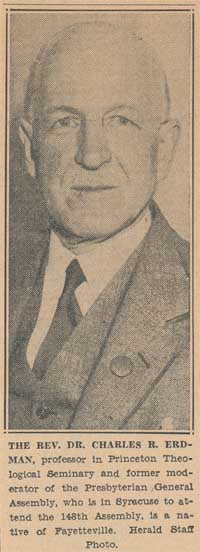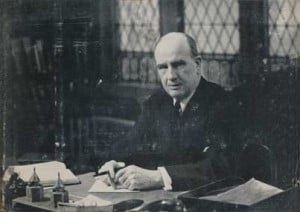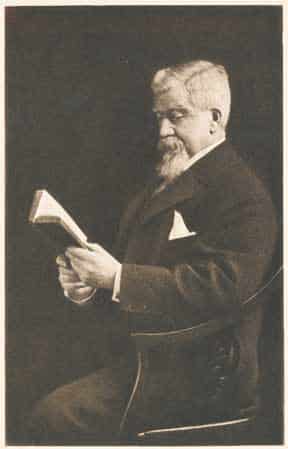 It was at the momentous Syracuse, N.Y. meeting of the General Assembly of the Presbyterian Church, U.S.A. where Dr. J. Gresham Machen was officially defrocked from the ministry of that denomination. That action in turn then prompted the founding of what was to become the Orthodox Presbyterian Church. Also in attendance at that General Assembly in Syracuse was one of Machen’s many adversaries, Dr. Charles R. Erdman, a man who was by all accounts staunchly evangelical. Yet he found himself in opposition to the course taken by Dr. Machen— he found himself siding with those very men who took a decidedly modernist and unbelieving approach to the Scriptures.
It was at the momentous Syracuse, N.Y. meeting of the General Assembly of the Presbyterian Church, U.S.A. where Dr. J. Gresham Machen was officially defrocked from the ministry of that denomination. That action in turn then prompted the founding of what was to become the Orthodox Presbyterian Church. Also in attendance at that General Assembly in Syracuse was one of Machen’s many adversaries, Dr. Charles R. Erdman, a man who was by all accounts staunchly evangelical. Yet he found himself in opposition to the course taken by Dr. Machen— he found himself siding with those very men who took a decidedly modernist and unbelieving approach to the Scriptures.
The Syracuse Herald gave some coverage of Dr. Erdman’s visit to his birthplace in Fayetteville, NY that year, noting:
“Dr. Erdman was born in Fayetteville, where his father was a Presbyterian minister, but when he was three weeks old, his parents moved to another charge. [Erdman was born on July 20, 1866].
“In spite of the short time Dr. Erdman was a resident of the Onandaga County village, however, he has frequently visited his birthplace and this week, before the adjournment of the General Assembly which he is attending, he will again visit his birthplace, he said Saturday.
“Dr. Erdman’s father, the Rev. William Jacob Erdman, preached in the same church, and lived in the same manse as did the father of Grover Cleveland, former President of the United States. His youngest daughter is the wife of Francis Grover Cleveland, son of the late former President.
“The greater part of Dr. Erdman’s boyhood was passed in Jamestown. He also lived in Chicago where his father was pastor of Dwight L. Moody’s church. He was graduated from Princeton University in 1886 and from Princeton Seminary in 1891. He holds [honorary] doctor’s degrees from Wooster College, Princeton University and Davidson College.
“For six years following his ordination in 1891 he was pastor of the Presbyterian Church at Overbook, Pa. Then he became pastor of the First Presbyterian Church of Germantown, Pa., where he remained until 1906 when he became a Princeton professor.
“He became a member of the Presbyterian Board of Foreign Missions in 1906 and in 1926 was elected as president, an office he still holds. He was elected moderator of the Presbyterian General Assembly in 1925. In the same year he was moderator of the New Brunswick Presbytery. In 1910 he was a delegate tot he World Missionary Conference in Edinburgh and in 1922 to the National Christian Council in Shanghai.
“He is the author of many books, including The Ruling Elder, Sunday Afternoon with a Railroad Man, Coming to the Communion, Within the Gates of the Far East, The Return of Christ, The Lord We Love, The Spirit of Christ, The Life of D.L. Moody, and expositions of most of the books of the New Testament.
“Dr. Erdman’s wife was Miss Estelle Pardee of Germantown, daugher of a widely-known coal operator. His son, the Rev. Calvin Pardee Erdman, also a Presbyterian minister, has preached in Hawaii and California….
“The Erdmans have a summer home at Saranac Lake.”
Embedded in that newspaper account are a few clues for the observant reader as to why Dr. Erdman found himself an opponent of Machen. Erdman had become attached to the denominational board of foreign missions, and Machen had been critical of that Board for fielding missionaries who held low views of Scripture. Moreover, Erdman’s personal and family connection to D.L. Moody might indicate a faith and a theology that was more generally evangelical and less confessional or Reformed in nature. Politics may also have had a part. By familial connection with Grover Cleveland, Dr. Erdman may have been a Democrat, whereas J. Gresham Machen was decidedly libertarian in his views and more of a political free-thinker.
Long-time Princeton Seminary professor Charles Erdman passed away on May 9, 1960. [Our apologies! The correct death date for Dr. Erdman is May 9, 1960. The confusion arose by way of his son’s death date—Charles R. Erdman, Jr. died on October 15, 1984.]
Words to Live By:
Why some men make the decisions they do is often a puzzle beyond our understanding. In pondering this point, we realize how much we must seek to live humbly in the fear of the Lord, for there are times when it takes a clear head and a resolute faith if we are to stand fast on the sure counsel of God’s Word. Too many of us are shaped by our associations, much more so than we realize. Seek instead to be shaped by the Word of God. Live each day as honestly as possible, confessing your sin, repenting and seeking the Lord’s mercy and grace.



